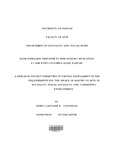| dc.description.abstract | It has been a government development agenda since 1963, to wipe out ignorance, illiteracy and disease. Thus realization of universal basic education has been identified as a pillar; the most powerful instruments for reducing poverty and inequality and for setting the basis for sustained economic growth. According to an article on the Daily Nation, 2007, free primary education was celebrated as enabling as many students as possible to get a chance to at least learn to read and write.
This programme was very opportune in addressing the challenges facing education levels in Kenya, more particularly in Kenya's informal settlements, such as Kibera. This is because; its main target areas were the arid and semiarid areas and informal settlements. These areas experienced high drop rates and low school enrollments because of the obstacles and barriers presented in them. The parents could not afford the basic requirements due to their low socioeconomic empowerment as much as they would wish to see their children in school.
Even though FPE was anticipated to change the way of life in its selected areas, the state of affairs is different. It is for this reason; the objective of this study was to determine how Kibera slum dwellers have responded to Free Primary Education. Response was explored through perception and levels of participation by stakeholders in the FPE programme and more specially the parents. The supposition been the understanding people have on a thing or issue positively or negatively influences their involved in it or with it.
The study used both qualitative and qualitative method if data collection. Similarly the data obtained were analyzed using both qualitative and quantitative methods.
The study found out that the response towards FPE in Kibera is low. This was attributed to the low levels of perception and levels participation of the Kibera slum dwellers. The parents believed that FPE was equivalent to absolute no payments and any contribution by the parents is however, misplaced and should be discouraged. Many of the residents of Kibera slums are low income earners who rely on wages for survival. This has adversely affected levels of access and participation in FPE in Kibera slum.
Despite the understanding that FPE successful implementation depended on various stakeholders' participation in it - decision making, goal setting, and teamwork, this was not the case in Kibera Slum. This called for its improvement to effectively rise above the challenges it faces in it implementation. This meant increased stakeholders commitment to the collective active involvement of all stakeholders in the entire planning, mOnitoring and evaluation of FPE. Every agent is necessary to its success, the earlier they become part of the team the better for its growth and sustainability. | en_US |

